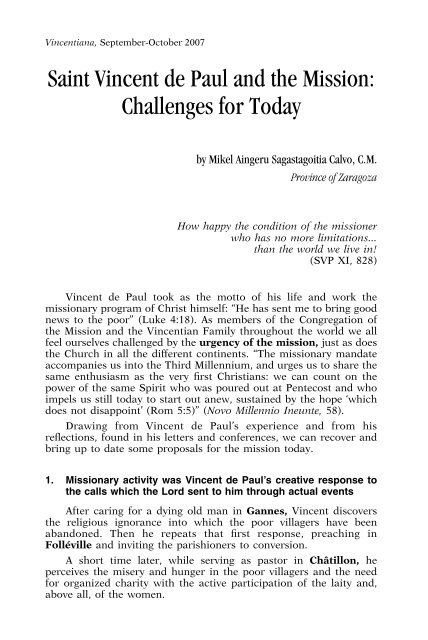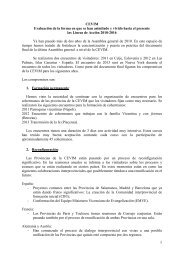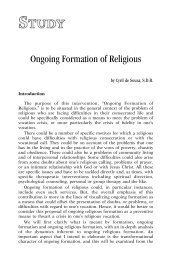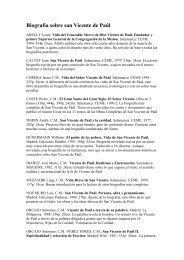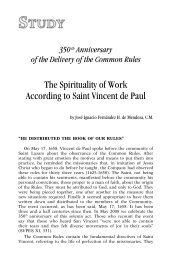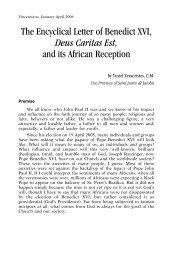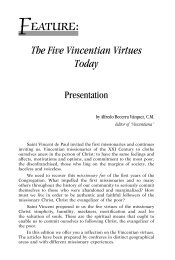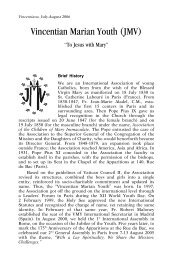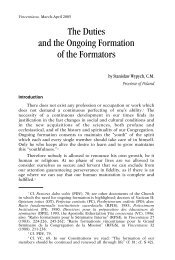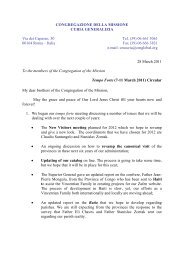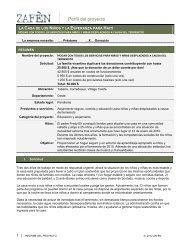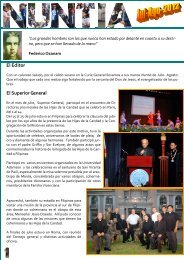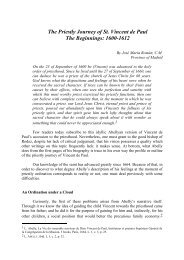Saint Vincent de Paul and the Mission: Challenges for ... - CMGlobal
Saint Vincent de Paul and the Mission: Challenges for ... - CMGlobal
Saint Vincent de Paul and the Mission: Challenges for ... - CMGlobal
You also want an ePaper? Increase the reach of your titles
YUMPU automatically turns print PDFs into web optimized ePapers that Google loves.
VINCENTIANA 5-2007 - INGLESE December 10, 2007 − 2ª BOZZA<br />
<strong>Vincent</strong>iana, September-October 2007<br />
<strong>Saint</strong> <strong>Vincent</strong> <strong>de</strong> <strong>Paul</strong> <strong>and</strong> <strong>the</strong> <strong>Mission</strong>:<br />
<strong>Challenges</strong> <strong>for</strong> Today<br />
by Mikel Aingeru Sagastagoitia Calvo, C.M.<br />
Province of Zaragoza<br />
How happy <strong>the</strong> condition of <strong>the</strong> missioner<br />
who has no more limitations...<br />
than <strong>the</strong> world we live in!<br />
(SVP XI, 828)<br />
<strong>Vincent</strong> <strong>de</strong> <strong>Paul</strong> took as <strong>the</strong> motto of his life <strong>and</strong> work <strong>the</strong><br />
missionary program of Christ himself: “He has sent me to bring good<br />
news to <strong>the</strong> poor” (Luke 4:18). As members of <strong>the</strong> Congregation of<br />
<strong>the</strong> <strong>Mission</strong> <strong>and</strong> <strong>the</strong> <strong>Vincent</strong>ian Family throughout <strong>the</strong> world we all<br />
feel ourselves challenged by <strong>the</strong> urgency of <strong>the</strong> mission, just as does<br />
<strong>the</strong> Church in all <strong>the</strong> different continents. “The missionary m<strong>and</strong>ate<br />
accompanies us into <strong>the</strong> Third Millennium, <strong>and</strong> urges us to share <strong>the</strong><br />
same enthusiasm as <strong>the</strong> very first Christians: we can count on <strong>the</strong><br />
power of <strong>the</strong> same Spirit who was poured out at Pentecost <strong>and</strong> who<br />
impels us still today to start out anew, sustained by <strong>the</strong> hope ‘which<br />
does not disappoint’ (Rom 5:5)” (Novo Millennio Ineunte, 58).<br />
Drawing from <strong>Vincent</strong> <strong>de</strong> <strong>Paul</strong>’s experience <strong>and</strong> from his<br />
reflections, found in his letters <strong>and</strong> conferences, we can recover <strong>and</strong><br />
bring up to date some proposals <strong>for</strong> <strong>the</strong> mission today.<br />
1. <strong>Mission</strong>ary activity was <strong>Vincent</strong> <strong>de</strong> <strong>Paul</strong>’s creative response to<br />
<strong>the</strong> calls which <strong>the</strong> Lord sent to him through actual events<br />
After caring <strong>for</strong> a dying old man in Gannes, <strong>Vincent</strong> discovers<br />
<strong>the</strong> religious ignorance into which <strong>the</strong> poor villagers have been<br />
ab<strong>and</strong>oned. Then he repeats that first response, preaching in<br />
Folléville <strong>and</strong> inviting <strong>the</strong> parishioners to conversion.<br />
A short time later, while serving as pastor in Châtillon, he<br />
perceives <strong>the</strong> misery <strong>and</strong> hunger in <strong>the</strong> poor villagers <strong>and</strong> <strong>the</strong> need<br />
<strong>for</strong> organized charity with <strong>the</strong> active participation of <strong>the</strong> laity <strong>and</strong>,<br />
above all, of <strong>the</strong> women.
VINCENTIANA 5-2007 - INGLESE December 10, 2007 − 2ª BOZZA<br />
<strong>Saint</strong> <strong>Vincent</strong> <strong>de</strong> <strong>Paul</strong> <strong>and</strong> <strong>the</strong> <strong>Mission</strong>: <strong>Challenges</strong> <strong>for</strong> Today<br />
The conversion of a heretic in Marchais who, after seeing <strong>the</strong><br />
work of <strong>the</strong> missioners un<strong>de</strong>rstood that <strong>the</strong> Holy Spirit gui<strong>de</strong>s <strong>the</strong><br />
Church, confirms in <strong>Vincent</strong> <strong>de</strong> <strong>Paul</strong> his conviction that <strong>the</strong> Lord is<br />
calling him to <strong>the</strong> evangelization of <strong>the</strong> poor.<br />
These events, above all those related to <strong>the</strong> lives of <strong>the</strong> poor, are<br />
mediations by means of which <strong>the</strong> Lord is manifesting His Will to<br />
<strong>Vincent</strong> <strong>de</strong> <strong>Paul</strong>.<br />
And <strong>Vincent</strong> <strong>de</strong> <strong>Paul</strong> knew to walk in <strong>the</strong> steps of Provi<strong>de</strong>nce <strong>and</strong><br />
to create new responses when faced with new situations. His first<br />
response, chronologically, will be popular missions. Later he will<br />
discover that <strong>the</strong> Lord is calling him to extend <strong>the</strong> mission to distant<br />
l<strong>and</strong>s <strong>and</strong>, with no hesitation, to send his best missioners <strong>for</strong> this<br />
work. His main foundations, <strong>the</strong> Congregation of <strong>the</strong> <strong>Mission</strong>, <strong>the</strong><br />
Confraternities of Charity, <strong>and</strong> <strong>the</strong> Daughters of Charity, he will<br />
also place in service of <strong>the</strong> mission.<br />
The Lord asks him (as he is gradually discovering) to <strong>de</strong>dicate<br />
his life to <strong>the</strong> evangelization of <strong>the</strong> poor, to continue <strong>the</strong> very same<br />
mission of Jesus Christ. <strong>Vincent</strong> does not hesitate to throw himself<br />
into <strong>the</strong> work with enthusiasm. He feels compelled to offer a<br />
response — bold responses that continue to surprise <strong>for</strong> <strong>the</strong>ir creative<br />
originality.<br />
Just so today, <strong>for</strong> us who follow Jesus Christ in <strong>the</strong> steps of<br />
<strong>Vincent</strong> <strong>de</strong> <strong>Paul</strong>, actual events, specifically those events related to<br />
poor persons, invite us to get moving, on cue with <strong>the</strong> mission:<br />
paying attention to <strong>the</strong> diverse realities of cultures <strong>and</strong> peoples,<br />
adapting ourselves to God’s steps with individuals <strong>and</strong> with groups,<br />
listening to <strong>the</strong> cries of those needs that are most urgent, cultivating<br />
<strong>the</strong> participation of everyone <strong>and</strong> <strong>the</strong> respect <strong>for</strong> everyone.<br />
John <strong>Paul</strong> II coined <strong>the</strong> expression ‘new cultural l<strong>and</strong>scapes<br />
<strong>and</strong> historical frontiers’ in or<strong>de</strong>r to refer to <strong>the</strong> new realities of<br />
contemporary civilization where <strong>the</strong> seed of <strong>the</strong> Gospel must be<br />
ma<strong>de</strong> present: “Family, culture, <strong>the</strong> world of labor, all economic<br />
goods, politics, science, technology, social communications, <strong>the</strong> great<br />
challenges of life, of solidarity, of peace, of professional ethics, of <strong>the</strong><br />
rights of <strong>the</strong> human person, of education, of religious liberty.” 1<br />
Calls of <strong>the</strong> Lord <strong>and</strong>, <strong>the</strong>re<strong>for</strong>e, <strong>the</strong> mission, cannot continue to<br />
be reduced to one place nor to only one activity nor to one <strong>for</strong>m only<br />
of evangelization or service. Faithfulness to <strong>the</strong> mission <strong>de</strong>m<strong>and</strong>s<br />
personal availability, a renewed faithfulness, <strong>and</strong> creativity. “The<br />
proclamation of <strong>the</strong> Gospel requires proclaimers, <strong>the</strong> harvest needs<br />
workers, <strong>the</strong> mission happens, above all, with men <strong>and</strong> women<br />
1 JOHN PAUL II, Closing Talk of <strong>the</strong> Lay Synod, Rome, October 3, 1987.<br />
345
VINCENTIANA 5-2007 - INGLESE December 10, 2007 − 2ª BOZZA<br />
346 M. A. Sagastagoitia Calvo<br />
consecrated by life to <strong>the</strong> work of <strong>the</strong> Gospel, willing to go<br />
throughout <strong>the</strong> whole world to bring salvation.” 2<br />
<strong>Mission</strong>ary restlessness appears in our communities frequently<br />
in intermittent ways. Faced with an especially grave situation,<br />
whe<strong>the</strong>r nearby or far away, generous responses are offered that are<br />
truly exemplary. However, <strong>the</strong>se things may not always have <strong>the</strong> true<br />
mission which is <strong>the</strong> criterion of our programs <strong>and</strong> ongoing pastoral<br />
tasks, <strong>the</strong> key or <strong>the</strong> sustaining drive that keeps <strong>the</strong> whole<br />
community on cue with creativity <strong>and</strong> which draws out responses<br />
from life itself. Personal <strong>de</strong>dication, working piece by piece, creative<br />
dreaming, pastoral zeal — <strong>the</strong>se continue to be <strong>the</strong> right dispositions<br />
(just as <strong>the</strong>y were in <strong>Vincent</strong> <strong>de</strong> <strong>Paul</strong> himself) that are nee<strong>de</strong>d to face<br />
up to <strong>the</strong> new requirements of <strong>the</strong> mission in our own time.<br />
2. The discovery of Jesus Christ, <strong>the</strong> Fa<strong>the</strong>r’s missioner, <strong>the</strong><br />
Evangelizer of <strong>the</strong> Poor, is <strong>the</strong> hid<strong>de</strong>n power that explains <strong>the</strong><br />
fruitfulness of <strong>Vincent</strong> <strong>de</strong> <strong>Paul</strong>’s heritage to us as missionary<br />
One celebrated researcher of <strong>the</strong> life <strong>and</strong> spiritual experience of<br />
<strong>Vincent</strong> <strong>de</strong> <strong>Paul</strong> wrote: “That teacher who is <strong>Saint</strong> <strong>Vincent</strong> has his<br />
own teacher who is Jesus Christ; one can recover in both his<br />
correspon<strong>de</strong>nce <strong>and</strong> in his talks a long series of <strong>de</strong>lightful lines,<br />
sometimes very unexpected, <strong>and</strong> with <strong>the</strong>se put toge<strong>the</strong>r a small book<br />
that could be called <strong>the</strong> Imitation of Jesus Christ according to <strong>Saint</strong><br />
<strong>Vincent</strong> <strong>de</strong> <strong>Paul</strong>. On <strong>the</strong> horizon of <strong>Saint</strong> <strong>Vincent</strong> <strong>the</strong>re always rises<br />
<strong>the</strong> Son of God.... Pay close attention to his life, episo<strong>de</strong> by episo<strong>de</strong>,<br />
one could even say minute by minute, in or<strong>de</strong>r to find <strong>the</strong>re lessons<br />
on how to act.” 3<br />
Certainly, one could never un<strong>de</strong>rst<strong>and</strong> <strong>the</strong> missionary activity of<br />
<strong>Vincent</strong> <strong>de</strong> <strong>Paul</strong>, nor any one of his works, without explicit reference<br />
to Jesus Christ. <strong>Vincent</strong> <strong>de</strong> <strong>Paul</strong> <strong>de</strong>sired, from <strong>the</strong> moment of his<br />
conversion, to follow Jesus Christ, to be centered in Him, to see<br />
himself one time after ano<strong>the</strong>r in Him, until he reached <strong>the</strong> point<br />
where at every moment he was able to do or not to do that which<br />
Christ would do or not do.<br />
<strong>Vincent</strong> <strong>de</strong> <strong>Paul</strong> wanted to make Jesus Christ <strong>the</strong> only rule of<br />
his life. And to those who grew to associate with his missionary<br />
works, he showed this same road. To Fa<strong>the</strong>r Antonio Portail, his first<br />
collaborator in <strong>the</strong> missions, he writes as early as May 1, 1635:<br />
“Remember, Fa<strong>the</strong>r, that we live in Jesus Christ because of <strong>de</strong>ath in<br />
2 JOHN PAUL II, Re<strong>de</strong>mptoris Missio, 79.<br />
3 M. GOYAU, La vie <strong>de</strong>s livres et <strong>de</strong>s âmes, Paris, 1923, 84. Cited by<br />
P. COSTE, El gran santo <strong>de</strong>l gran siglo, vol. III, p. 263.
VINCENTIANA 5-2007 - INGLESE December 10, 2007 − 2ª BOZZA<br />
<strong>Saint</strong> <strong>Vincent</strong> <strong>de</strong> <strong>Paul</strong> <strong>and</strong> <strong>the</strong> <strong>Mission</strong>: <strong>Challenges</strong> <strong>for</strong> Today<br />
347<br />
Jesus Christ, <strong>and</strong> our life has to be hid<strong>de</strong>n in Jesus Christ <strong>and</strong> full of<br />
Jesus Christ, so that, in or<strong>de</strong>r to die like Jesus Christ, we must live as<br />
Jesus Christ.” 4 In this same way, notice <strong>the</strong> surprising expression that<br />
we find in his letter to Fa<strong>the</strong>r Nicolás Etienne on January 30, 1656:<br />
“Our Lord Jesus Christ is our fa<strong>the</strong>r, our mo<strong>the</strong>r, <strong>and</strong> our all.” 5<br />
In <strong>the</strong> <strong>Vincent</strong>ian experience <strong>the</strong>re appears a strong relation<br />
between Jesus Christ <strong>and</strong> <strong>the</strong> Fa<strong>the</strong>r. Jesus Christ has been sent by<br />
<strong>the</strong> Fa<strong>the</strong>r. Jesus Christ lives totally <strong>de</strong>dicated to doing <strong>the</strong> will of <strong>the</strong><br />
Fa<strong>the</strong>r. Jesus Christ lives in continual prayer with <strong>the</strong> Fa<strong>the</strong>r. 6<br />
<strong>Vincent</strong> <strong>de</strong> <strong>Paul</strong> never tires of repeating that <strong>the</strong> Son of God, <strong>the</strong><br />
missionary of <strong>the</strong> Fa<strong>the</strong>r, came to <strong>the</strong> world to evangelize <strong>the</strong> poor.<br />
Only to add immediately that missioners do nothing o<strong>the</strong>r than to<br />
continue <strong>the</strong> mission of Jesus Christ on earth.<br />
In his conference to <strong>the</strong> missioners on October 29, 1638, <strong>Vincent</strong><br />
states: “In this vocation we live in such a way as to be con<strong>for</strong>med to<br />
our Lord Jesus Christ who, it seems, when he came to this world,<br />
chose as his principal task that of assisting <strong>and</strong> caring <strong>for</strong> <strong>the</strong> poor.<br />
Misit me evangelizare pauperibus. And if one would ask our Lord:<br />
What have you come to do on earth? — To help <strong>the</strong> poor. — And<br />
something else? — To help <strong>the</strong> poor, etc. In his company <strong>the</strong>re were<br />
no o<strong>the</strong>rs but <strong>the</strong> poor <strong>and</strong> He stayed only a little in <strong>the</strong> cities, almost<br />
always conversing with <strong>the</strong> villagers, <strong>and</strong> teaching <strong>the</strong>m. Would we<br />
not be happy ourselves to be in <strong>the</strong> mission with <strong>the</strong> same purpose<br />
which committed God to become man? And if one would ask a<br />
missioner, would it not be a great honor to say as did our Lord: Misit<br />
me evangelizare pauperibus? I am here to catechize, to instruct, to<br />
confess, to help <strong>the</strong> poor.” 7<br />
The mission is always <strong>the</strong> prolongation of <strong>the</strong> action of <strong>the</strong><br />
missionary Christ Jesus. Because of this, only in <strong>the</strong> measure in<br />
which he reflects Christ <strong>and</strong> enters into His own dispositions <strong>and</strong><br />
adopts his attitu<strong>de</strong>s, will <strong>the</strong> missioner make his life true mission.<br />
3. In <strong>the</strong> Church, <strong>the</strong> continuer of <strong>the</strong> mission of Jesus Christ to<br />
<strong>the</strong> service of <strong>the</strong> poor<br />
As a consequence of his vision of Christ, <strong>Vincent</strong> <strong>de</strong> <strong>Paul</strong> sees <strong>and</strong><br />
experiences <strong>the</strong> Church as continuer of <strong>the</strong> mission of Jesus Christ,<br />
distancing himself from <strong>the</strong> dominant ecclesiologies of his time. 8<br />
4 SV I, 295.<br />
5 SV V, 534.<br />
6 Cf. SV XII, 108; XI, 313; IX, 409; X, 243.<br />
7 SV XI, 108. Cf. aussi SV XI, 130-131, 134-135; XII, 87.<br />
8 A. Dodin, one of <strong>the</strong> most prominent experts on <strong>Vincent</strong>, clearly affirms<br />
this: “What is it that characterizes <strong>the</strong> whole presentation of Church <strong>for</strong>
VINCENTIANA 5-2007 - INGLESE December 11, 2007 − 3ª BOZZA<br />
348 M. A. Sagastagoitia Calvo<br />
<strong>Vincent</strong> <strong>de</strong> <strong>Paul</strong> stays within <strong>the</strong> doctrinal ecclesiology taught in<br />
<strong>the</strong> manuals. 9 He wants to live in <strong>the</strong> faith of <strong>the</strong> Church without<br />
separating himself, even <strong>the</strong> least bit, from what <strong>the</strong> Church<br />
teaches. 10 But <strong>the</strong> originality of <strong>Vincent</strong> <strong>de</strong> <strong>Paul</strong> in his vision of <strong>the</strong><br />
Church, is rooted in seeing her as one historical reality, itinerant,<br />
missionary, <strong>and</strong> at <strong>the</strong> service of <strong>the</strong> poor, as <strong>the</strong> continuer of <strong>the</strong><br />
mission of Christ that she is. 11<br />
<strong>Vincent</strong> <strong>de</strong> <strong>Paul</strong> will not place <strong>the</strong> emphasis on <strong>the</strong> hierarchy,<br />
nor on any exterior or shiny adornment. For <strong>Vincent</strong>, “<strong>the</strong> Church is<br />
above all <strong>the</strong> poor people who seek help, those ‘good people’ who<br />
<strong>Vincent</strong> had encountered already <strong>and</strong> with whom he had felt<br />
i<strong>de</strong>ntified while a pastor in Clichy, near Paris. To <strong>the</strong> service of this<br />
people he <strong>and</strong> his own would <strong>de</strong>dicate <strong>the</strong>mselves. When speaking of<br />
<strong>the</strong> humble <strong>and</strong> <strong>the</strong> most poor, he would say: ‘Our lords <strong>and</strong> our<br />
masters’ thus opening up a new perspective in <strong>the</strong> <strong>the</strong>ology of <strong>the</strong><br />
mystical body.” 12<br />
So <strong>the</strong>n it will not surprise us to find in <strong>Vincent</strong> <strong>de</strong> <strong>Paul</strong>’s<br />
correspon<strong>de</strong>nce such clear expressions about where to find <strong>the</strong><br />
Church of Jesus Christ: “The Church is nei<strong>the</strong>r in <strong>the</strong> silk nor gold of<br />
<strong>the</strong> prince-bishops or abbots, but ra<strong>the</strong>r in <strong>the</strong> flesh <strong>and</strong> blood, in <strong>the</strong><br />
sufferings <strong>and</strong> tears of <strong>the</strong> people. The People of God are here, <strong>and</strong><br />
whe<strong>the</strong>r aware or not, participant in <strong>the</strong> mystery of <strong>the</strong> life, <strong>the</strong><br />
sufferings, <strong>the</strong> <strong>de</strong>ath of <strong>the</strong> Son of God, in <strong>the</strong> hope of his glory.<br />
Called to join <strong>the</strong> Council of Conscience, <strong>Vincent</strong> <strong>de</strong> <strong>Paul</strong> will<br />
remember this Church when it is time <strong>for</strong> naming bishops <strong>for</strong> <strong>the</strong><br />
service of <strong>the</strong> people of God <strong>and</strong>, first of all, <strong>for</strong> <strong>the</strong> poor.” 13<br />
For <strong>Vincent</strong> <strong>de</strong> <strong>Paul</strong>, <strong>the</strong> mission of <strong>the</strong> Church is none o<strong>the</strong>r<br />
than to continue <strong>the</strong> work of Christ, to do just what He did on<br />
earth, cooperate with Him in <strong>the</strong> salvation of all people. This close<br />
relationship between Christ <strong>and</strong> <strong>the</strong> Church is obvious in <strong>Vincent</strong>ian<br />
expressions used when referring to <strong>the</strong> Church: “Spouse of <strong>the</strong><br />
<strong>Vincent</strong>? That it is completely different than any ecclesiology ‘with roman<br />
inspiration.’ I think here of that Church taken from <strong>the</strong> studies of Cardinal<br />
Bellarmine, <strong>and</strong> of St. Peter Canisius: a hierarchical Church, stable <strong>and</strong><br />
vertical. At its peak, on <strong>the</strong> top of <strong>the</strong> pyramid, is <strong>the</strong> Pope, <strong>the</strong>n <strong>the</strong> bishops,<br />
<strong>the</strong> priests, <strong>and</strong> at <strong>the</strong> bottom, <strong>the</strong> laity. <strong>Vincent</strong> did not have this image<br />
<strong>and</strong> he’s not <strong>the</strong> only one.” A. DODIN, Lecciones sobre vicencianismo, Ceme,<br />
Salamanca, 1978, pp. 66-67.<br />
9<br />
Cf. SV VI, 263-7 (lettre du 2 avril 1657).<br />
10<br />
Cf. ABELLY II, XII, p. 411.<br />
11<br />
A. DODIN, op. cit., 67.<br />
12<br />
A. SYLVESTRE, <strong>Saint</strong> <strong>Vincent</strong> el L’Église, en AA.VV., Monsieur <strong>Vincent</strong>,<br />
temoin <strong>de</strong> l’evangile, Toulouse, Animation <strong>Vincent</strong>ienne (1990), p. 126.<br />
13<br />
CABIERS, San Vicente <strong>de</strong> Paúl y la Iglesia, ANALES (1974), p. 75.
VINCENTIANA 5-2007 - INGLESE December 10, 2007 − 2ª BOZZA<br />
<strong>Saint</strong> <strong>Vincent</strong> <strong>de</strong> <strong>Paul</strong> <strong>and</strong> <strong>the</strong> <strong>Mission</strong>: <strong>Challenges</strong> <strong>for</strong> Today<br />
Savior,” “Bri<strong>de</strong> of Jesus Christ,” 14 “Vineyard of <strong>the</strong> Lord,” 15 “field of<br />
grain” that requires workers, 16 “mystical body.” 17<br />
It is exactly on this last image, <strong>the</strong> most often used, that <strong>Vincent</strong><br />
<strong>de</strong> <strong>Paul</strong> constructs his sense of Church charity: “All our members are<br />
so united <strong>and</strong> bound toge<strong>the</strong>r that what is wrong in one is wrong in<br />
all. All <strong>the</strong> more so Christians who are members of one body <strong>and</strong><br />
among <strong>the</strong>mselves must in<strong>de</strong>ed suffer toge<strong>the</strong>r. What is this! To be<br />
Christian <strong>and</strong> see <strong>the</strong> suffering of one’s bro<strong>the</strong>r without weeping with<br />
him nor experiencing sickness with him! This is not to show charity;<br />
it is to be Christian on <strong>the</strong> surface; it is to lack humanity, to be lower<br />
than animals.” 18<br />
Insi<strong>de</strong> this body that is <strong>the</strong> Church, <strong>Vincent</strong> <strong>de</strong> <strong>Paul</strong> paid special<br />
attention to <strong>the</strong> poor who are “<strong>the</strong> afflicted members of our Lord.” 19<br />
Evangelization of <strong>the</strong> poor is <strong>the</strong> criterion <strong>and</strong> <strong>the</strong> validating sign<br />
that <strong>the</strong> Holy Spirit is guiding <strong>the</strong> Church. 20<br />
<strong>Saint</strong> <strong>Vincent</strong> has discovered that <strong>the</strong> true person is <strong>the</strong> poor<br />
<strong>and</strong>, <strong>for</strong> that matter, <strong>the</strong> true people, <strong>the</strong> people of God, <strong>the</strong> Church,<br />
is <strong>the</strong> world of <strong>the</strong> poor. The hierarchy has nothing but <strong>the</strong> function<br />
of service. <strong>Saint</strong> <strong>Vincent</strong> lives out of this intuition, but it will be<br />
Bossuet, his disciple, who gives <strong>for</strong>m to this intuition:<br />
“Jesus Christ has come to <strong>the</strong> world to reestablish <strong>the</strong> or<strong>de</strong>r<br />
that pri<strong>de</strong> had broken. In <strong>the</strong> world, <strong>the</strong> rich hold <strong>the</strong> first<br />
ranks; in <strong>the</strong> Reign of Jesus Christ, <strong>the</strong> first places belong to<br />
<strong>the</strong> poor, who are <strong>the</strong> first <strong>and</strong> true children of <strong>the</strong> Church.<br />
In <strong>the</strong> world, <strong>the</strong> poor are subject to <strong>the</strong> rich <strong>and</strong> serve <strong>the</strong>m;<br />
in <strong>the</strong> holy Church, <strong>the</strong> rich are admitted only on condition<br />
of serving <strong>the</strong> poor. In <strong>the</strong> world, all privilege belongs to<br />
<strong>the</strong> powerful <strong>and</strong> to those who support <strong>the</strong>m; in <strong>the</strong> Church<br />
of Jesus Christ, graces <strong>and</strong> blessings belong to <strong>the</strong> poor,<br />
<strong>and</strong> <strong>the</strong> rich have no privilege except to be in <strong>the</strong> midst of<br />
<strong>the</strong> poor.” 21<br />
<strong>Vincent</strong>ian scholars do not hesitate to agree that this sermon of<br />
Bossuet is <strong>the</strong> best syn<strong>the</strong>sis found of that experience of Church<br />
which inspired <strong>the</strong> life <strong>and</strong> mission of <strong>Vincent</strong> <strong>de</strong> <strong>Paul</strong>. 22<br />
14<br />
Cf. SV I, 571; III, 182; XII, 158-159.<br />
15<br />
Cf. SV V, 107, 178, 462; VII, 541; VIII, 126.<br />
16<br />
SV VIII, 125; IX, 734.<br />
17<br />
Cf. SV IX, 1; X, 364; XII, 96-97, 273.<br />
18<br />
SV XI, 272.<br />
19<br />
SV V, 85.<br />
20<br />
Cfr. ABELLY I, XIII, pp. 55-56.<br />
21<br />
Bossuet, 1659 sermon. In AA.VV., L’Église, pp. 7-8.<br />
22 Cf. id., p. 4.<br />
349
VINCENTIANA 5-2007 - INGLESE December 10, 2007 − 2ª BOZZA<br />
350 M. A. Sagastagoitia Calvo<br />
Those of us who today follow Jesus Christ in <strong>the</strong> steps of <strong>Vincent</strong><br />
<strong>de</strong> <strong>Paul</strong>, know, through <strong>the</strong> ecclesiology of Vatican Council II, that<br />
<strong>the</strong> Church is <strong>the</strong> community which makes Jesus Christ present in<br />
history <strong>and</strong> that lives out <strong>the</strong> responsibility to continue His<br />
<strong>Mission</strong>. “The presentation of <strong>the</strong> gospel message does not constitute<br />
<strong>for</strong> <strong>the</strong> Church some kind of option; it is by means of <strong>the</strong> obligation<br />
placed on her, by <strong>the</strong> Lord’s comm<strong>and</strong>, with <strong>the</strong> goal that people<br />
believe <strong>and</strong> are saved.” 23 The mission constitutes <strong>the</strong> very reason to<br />
belong to <strong>the</strong> Church, which exists to evangelize. 24 Evangelization is<br />
<strong>the</strong> grace <strong>and</strong> <strong>the</strong> purpose of <strong>the</strong> Church; it is her vocation <strong>and</strong><br />
i<strong>de</strong>ntity.<br />
The mission is Church activity. Evangelization is no private<br />
matter, but ra<strong>the</strong>r “an act profoundly ecclesial.” 25 It is <strong>the</strong> Church<br />
who sends <strong>the</strong> missionary. And <strong>the</strong> end of all missionary activity is<br />
<strong>the</strong> proclamation of Christ <strong>and</strong> <strong>the</strong> <strong>for</strong>mation of <strong>the</strong> church<br />
community. 26 “God is love, <strong>and</strong> whoever remains in love remains in<br />
God <strong>and</strong> God in him” asserts <strong>the</strong> first letter of John (1 Jn 4:16). The<br />
discovery of <strong>the</strong> love of God is what raises up Christians in every<br />
epoch of history, to share <strong>the</strong> Good News throughout <strong>the</strong> world.<br />
In <strong>the</strong> Church <strong>and</strong> as Church, each one according to his proper<br />
ministry <strong>and</strong> charism, must know himself to be truly a missionary,<br />
driven by <strong>the</strong> pastoral zeal of <strong>the</strong> same Christ, that will be “attention,<br />
ten<strong>de</strong>rness, compassion, welcome, availability, interest in <strong>the</strong><br />
problems of <strong>the</strong> people... fervor of <strong>the</strong> Spirit, interior excitement<br />
which nothing nor anyone could extinguish,” 27 especially committed<br />
to <strong>the</strong> cause of <strong>the</strong> poor.<br />
4. The poor, protagonists of <strong>the</strong> mission<br />
The mission, as <strong>Vincent</strong> <strong>de</strong> <strong>Paul</strong> un<strong>de</strong>rstood <strong>and</strong> lived it out,<br />
integrates <strong>the</strong> world of <strong>the</strong> poor as an essential, constitutive element.<br />
Christ is <strong>the</strong> Fa<strong>the</strong>r’s missioner, who has been sent to this world<br />
to evangelize <strong>the</strong> poor. The Church, <strong>the</strong> continuer in history of<br />
Christ’s mission, has a duty to <strong>the</strong> poor.<br />
The centrality of <strong>the</strong> poor in <strong>the</strong> mission of Christ <strong>and</strong> of <strong>the</strong><br />
Church has been one discovery that has been maturing in <strong>Vincent</strong> <strong>de</strong><br />
<strong>Paul</strong>’s experience. As J. Corera states, “<strong>Vincent</strong> <strong>de</strong> <strong>Paul</strong> lived <strong>the</strong> first<br />
23 Evangelii Nunti<strong>and</strong>i, 5.<br />
24 Cf. Ad Gentes, 6.<br />
25 Evangelii Nunti<strong>and</strong>i, 60.<br />
26 Cf. Ad Gentes, 6.<br />
27 Re<strong>de</strong>mptoris Missio, 89; Evangelii Nunti<strong>and</strong>i, 80. “Pastoral charity<br />
<strong>de</strong>termines <strong>the</strong> manner with which <strong>the</strong> missionary thinks, acts, <strong>and</strong> relates<br />
with everyone else” (Pastores Dabo Vobis, 23).
VINCENTIANA 5-2007 - INGLESE December 10, 2007 − 2ª BOZZA<br />
<strong>Saint</strong> <strong>Vincent</strong> <strong>de</strong> <strong>Paul</strong> <strong>and</strong> <strong>the</strong> <strong>Mission</strong>: <strong>Challenges</strong> <strong>for</strong> Today<br />
351<br />
thirty years of his life searching <strong>for</strong> a com<strong>for</strong>table <strong>and</strong> respectable<br />
place in <strong>the</strong> respectable society of this time.” 28 The Lord, by means of<br />
events <strong>and</strong> people, gradually brought about in him <strong>the</strong> discovery of<br />
his true vocation. “In or<strong>de</strong>r to <strong>de</strong>dicate his life he had first to discover<br />
<strong>the</strong> existence of <strong>the</strong> poor, since it was no difficult thing in his time to<br />
take on a lifestyle <strong>and</strong> i<strong>de</strong>als that would shield one from <strong>the</strong> annoying<br />
presence of <strong>the</strong> poor.” 29<br />
The discovery of <strong>the</strong> poor <strong>and</strong> <strong>the</strong>ir suffering would not be<br />
enough to explain <strong>the</strong> surren<strong>de</strong>r of his whole life to <strong>the</strong>ir<br />
evangelization <strong>and</strong> service. If <strong>Vincent</strong> <strong>de</strong> <strong>Paul</strong> can <strong>de</strong>dicate his person<br />
<strong>and</strong> all <strong>the</strong> institutions he foun<strong>de</strong>d to <strong>the</strong> poor, it is because he sees<br />
everything in God; <strong>the</strong> poor are Jesus Christ <strong>for</strong> us, <strong>the</strong>y are His<br />
suffering members. Only from God, only from faith is it possible to<br />
discover Christ in <strong>the</strong> poor. There are many occasions when <strong>Vincent</strong><br />
speaks to <strong>the</strong> Daughters of Charity <strong>and</strong> to <strong>the</strong> priests of <strong>the</strong> <strong>Mission</strong><br />
stressing that service to <strong>the</strong> poor is service to Jesus Christ. 30 Thus, <strong>for</strong><br />
example, in a talk to <strong>the</strong> missioners in January, 1657, he argues:<br />
“God loves <strong>the</strong> poor, <strong>and</strong> consequently loves those who love <strong>the</strong> poor;<br />
since, when a person is much loved, this affect is felt by his friends<br />
<strong>and</strong> servants. Just so, this little company of <strong>the</strong> <strong>Mission</strong> seeks to<br />
<strong>de</strong>dicate itself completely to serve <strong>the</strong> poor who are God’s preferred<br />
ones; <strong>for</strong> this reason we can hope that, by our love of <strong>the</strong>m, God will<br />
love us as well.” 31<br />
And, while encouraging <strong>the</strong> Daughters of Charity to <strong>de</strong>dicate<br />
<strong>the</strong>mselves to <strong>the</strong> service of <strong>the</strong> poor, in his conference of November<br />
11, 1657, he assures <strong>the</strong>m: “My daughters, if only you would know<br />
that <strong>the</strong> greatest grace is to serve <strong>the</strong> poor, since you have been called<br />
by God to do this!... The poor are <strong>the</strong> great lords of heaven; it is <strong>the</strong>ir<br />
role to open its gates.” 32<br />
Never<strong>the</strong>less, <strong>for</strong> <strong>Vincent</strong> <strong>de</strong> <strong>Paul</strong>, <strong>the</strong> poor are not only <strong>the</strong><br />
object of <strong>the</strong> mission. <strong>Vincent</strong> <strong>de</strong> <strong>Paul</strong> is convinced that “only <strong>the</strong><br />
poor are able to save <strong>the</strong> poor.” 33<br />
The poor cannot be passive recipients of evangelical activity; <strong>the</strong>y<br />
must participate with <strong>the</strong>ir own possibilities <strong>and</strong> energy. <strong>Vincent</strong> <strong>de</strong><br />
28<br />
J. CORERA, “Qui ad margines societatis sunt reiecti,” in VINCENTIANA<br />
(1988), p. 346.<br />
29<br />
J. CORERA, The Poor According to St. <strong>Vincent</strong>, in VINCENTIANA (1984),<br />
p. 583.<br />
30<br />
Cf. SVP IX, 252.<br />
31<br />
SV XI, 392 s.<br />
32<br />
SV X, 332, 337.<br />
33<br />
Thusly has J. Anouilh interpreted <strong>Vincent</strong>’s intuitions, in <strong>the</strong> script<br />
<strong>de</strong>veloped <strong>for</strong> <strong>the</strong> movie Monsieur <strong>Vincent</strong>, directed by M. Cloche in 1947. The<br />
script can be found in: Monsieur <strong>Vincent</strong>, Ediciones Fe y Vida, Teruel, 1993.
VINCENTIANA 5-2007 - INGLESE December 10, 2007 − 2ª BOZZA<br />
352 M. A. Sagastagoitia Calvo<br />
<strong>Paul</strong> states this clearly: “They no longer need to assist only those who<br />
are unable to work or find <strong>the</strong>ir basic sustenance, <strong>and</strong> those who are<br />
in danger of dying of hunger if not helped. In effect if someone<br />
barely has <strong>the</strong> energy to work, you should buy him some tools,<br />
appropriate to his profession, without giving him anything else. Alms<br />
are not <strong>for</strong> those who can work... but <strong>for</strong> <strong>the</strong> infirm poor, orphans<br />
<strong>and</strong> <strong>the</strong> el<strong>de</strong>rly.” 34<br />
That which is without doubt one <strong>the</strong> most original intuitions of<br />
<strong>Vincent</strong> <strong>de</strong> <strong>Paul</strong>, <strong>the</strong> Company of <strong>the</strong> Daughters of Charity, is<br />
constituted by poor village girls. These poor young women turn out<br />
to be <strong>for</strong> <strong>Vincent</strong> <strong>de</strong> <strong>Paul</strong> <strong>the</strong> best agents of evangelization of <strong>the</strong><br />
poor: “Know this, my daughters, that I have learned that <strong>the</strong>se poor<br />
people are very grateful <strong>for</strong> <strong>the</strong> grace that God has given <strong>the</strong>m <strong>and</strong> to<br />
see that <strong>the</strong> Daughters will be present to <strong>the</strong>m <strong>and</strong> that <strong>the</strong>se Sisters<br />
have no o<strong>the</strong>r interest in <strong>the</strong>m than <strong>the</strong> love of God; <strong>the</strong>y say that<br />
<strong>the</strong>y now realize that God is <strong>the</strong> protector of <strong>the</strong> poor. See how<br />
beautiful it is to help <strong>the</strong>se poor people to recognize <strong>the</strong> goodness of<br />
God! Why, <strong>the</strong>y un<strong>de</strong>rst<strong>and</strong> perfectly that it is God who moves <strong>the</strong><br />
Sisters to do this service.” 35<br />
“The poor are <strong>for</strong> <strong>Saint</strong> <strong>Vincent</strong> <strong>the</strong> place of faith; only in <strong>the</strong>m<br />
does one find Jesus Christ <strong>and</strong> in Jesus Christ does one find <strong>the</strong> living<br />
God.” 36 “Among <strong>the</strong> poor is found true religion, a living faith.” 37<br />
In <strong>the</strong> conference of December 13, 1658, he does not hesitate to<br />
confess to his missioners: “The poor will one day dispute our place in<br />
paradise <strong>and</strong> will snatch it away from us, because <strong>the</strong>re exists a great<br />
difference between <strong>the</strong>ir way of loving God <strong>and</strong> our way. Their love is<br />
shown in <strong>the</strong>ir suffering, in <strong>the</strong>ir humiliations, in labor <strong>and</strong> in<br />
con<strong>for</strong>mity with <strong>the</strong> will of God. And ours, if we have any, how will it<br />
be known?” 38<br />
He feels, <strong>and</strong> he says so at <strong>the</strong> end of his life, that he has been<br />
evangelized by <strong>the</strong>m, or perhaps, that through <strong>the</strong>m he has finally<br />
learned what <strong>the</strong> true gospel means <strong>and</strong> what true faith means. Now<br />
he has no security in his life o<strong>the</strong>r than <strong>de</strong>dication to <strong>the</strong> poor;<br />
including, he hopes, <strong>for</strong> his own <strong>de</strong>finitive salvation through <strong>the</strong>m. 39<br />
Since “<strong>the</strong>re is no better way to assure our eternal happiness than to<br />
live <strong>and</strong> die in <strong>the</strong> service of <strong>the</strong> poor.” 40<br />
34 SV IV, 183.<br />
35 SV X, 512.<br />
36 J. CORERA, Diez estudios vicencianos [Ten <strong>Vincent</strong>ian Studies], p. 39.<br />
37 SV XII, 171.<br />
38 SV XII, 100-101.<br />
39 Cf. SVP IX, 241.<br />
40 SV III, 392.
VINCENTIANA 5-2007 - INGLESE December 10, 2007 − 2ª BOZZA<br />
<strong>Saint</strong> <strong>Vincent</strong> <strong>de</strong> <strong>Paul</strong> <strong>and</strong> <strong>the</strong> <strong>Mission</strong>: <strong>Challenges</strong> <strong>for</strong> Today<br />
So, <strong>the</strong>n, to continue Christ’s mission in our world today, in <strong>the</strong><br />
steps of <strong>Vincent</strong> <strong>de</strong> <strong>Paul</strong>, we will have to seek out <strong>the</strong> most ab<strong>and</strong>oned<br />
poor, in such a way that, in <strong>the</strong> words of John <strong>Paul</strong> II, “no one<br />
should relax while, in your country, <strong>the</strong>re is one man, one woman,<br />
one child, one old person, one sick person, one child of God!... whose<br />
human <strong>and</strong> Christian dignity is not respected <strong>and</strong> loved.” 41<br />
Actually <strong>the</strong> mission has become truly universal when <strong>the</strong> most<br />
poor are <strong>the</strong> protagonists, <strong>the</strong> participants in full communion of <strong>the</strong><br />
goods of <strong>the</strong> Reign of God. 42<br />
5. Lay persons in <strong>the</strong> Church in service of <strong>the</strong> <strong>Mission</strong><br />
Ever since <strong>the</strong> experience lived out by <strong>Vincent</strong> <strong>de</strong> <strong>Paul</strong> in<br />
Châtillon, lay persons, <strong>and</strong> particularly women, appear as agents in<br />
<strong>the</strong> Church in service of <strong>the</strong> mission. 43<br />
<strong>Vincent</strong> <strong>de</strong> <strong>Paul</strong> recognizes that women had no apostolic activity<br />
in <strong>the</strong> Church of his time, noting that this was not so in <strong>the</strong> Church<br />
of <strong>the</strong> first centuries: “There have been some eight hundred years in<br />
which women have had no public occupation in <strong>the</strong> Church. Be<strong>for</strong>e,<br />
<strong>the</strong>re existed <strong>de</strong>aconesses concerned with organizing women within<br />
<strong>the</strong> Church <strong>and</strong> instructing <strong>the</strong>m about <strong>the</strong> ceremonies which <strong>the</strong>n<br />
were used. But... in <strong>the</strong> times of Charlemagne, this use ceased <strong>and</strong><br />
your gen<strong>de</strong>r remained <strong>de</strong>prived from all occupation.” 44<br />
<strong>Vincent</strong> <strong>de</strong> <strong>Paul</strong>, who recognizes <strong>the</strong> existing situation,<br />
never<strong>the</strong>less does not accept it. He remembers that <strong>the</strong>re were<br />
women at <strong>the</strong> si<strong>de</strong> of Jesus Christ <strong>and</strong> that <strong>the</strong>y fulfilled apostolic<br />
ministry: “Among those who remained firm in following our Lord<br />
<strong>the</strong>re were women as well as men, who followed Him up to <strong>the</strong> cross.<br />
The women were not apostles, but <strong>for</strong>med an or<strong>de</strong>r whose office<br />
consisted in contributing to <strong>the</strong> ministry of <strong>the</strong> apostles, to attend to<br />
<strong>the</strong>ir needs <strong>and</strong> to <strong>the</strong> needs of <strong>the</strong> faithful.” 45<br />
For this reason, <strong>Vincent</strong> <strong>de</strong> <strong>Paul</strong> is convinced that <strong>the</strong> time has<br />
come <strong>for</strong> women to return to carrying out <strong>the</strong> ministry that belongs<br />
to <strong>the</strong>m in <strong>the</strong> mission of <strong>the</strong> Church. 46<br />
41 JOHN PAUL II, Homily During <strong>the</strong> Celebration of <strong>the</strong> Word in Viedma<br />
(Argentina), op. cit., 637.<br />
42 Cf. Re<strong>de</strong>mptoris Missio, 26.<br />
43 A. Dodin has noted how, through <strong>the</strong> intervention of <strong>Vincent</strong> <strong>de</strong> <strong>Paul</strong>,<br />
attention was given to <strong>the</strong> role of <strong>the</strong> laity — particularly of women — in <strong>the</strong><br />
Church’s direct apostolate. Cf. A. DODIN, “St. <strong>Vincent</strong> <strong>de</strong> <strong>Paul</strong> <strong>and</strong> Women in<br />
<strong>the</strong> Life of <strong>the</strong> Church,” in Lecciones sobre vicencianismo [Lessons About<br />
<strong>Vincent</strong>ianism], pp. 161 ff.<br />
44 ABELLY II, X, p. 364.<br />
45 ABELLY, l.c., p. 368.<br />
46 Cf. ABELLY, l.c., p. 364.<br />
353
VINCENTIANA 5-2007 - INGLESE December 10, 2007 − 2ª BOZZA<br />
354 M. A. Sagastagoitia Calvo<br />
<strong>Vincent</strong> <strong>de</strong> <strong>Paul</strong> is conscious that <strong>the</strong> participation of women in<br />
<strong>the</strong> mission of <strong>the</strong> Church encounters all kinds of resistance, some<br />
foun<strong>de</strong>d even in expressions of <strong>Saint</strong> <strong>Paul</strong>; consequently, <strong>Vincent</strong><br />
hastens to <strong>de</strong>clare that women who serve in <strong>the</strong> mission of <strong>the</strong><br />
Church are dispensed from any possible prohibition. 47 And he clearly<br />
involves women in <strong>the</strong> missionary work of <strong>the</strong> Church, in <strong>the</strong> very<br />
building up of <strong>the</strong> Church. 48<br />
<strong>Saint</strong> <strong>Vincent</strong> <strong>de</strong> <strong>Paul</strong> had <strong>the</strong> audacity to incorporate lay<br />
persons in missionary activity. The <strong>Vincent</strong>ian Family today<br />
constitutes a potential missionary thanks to thous<strong>and</strong>s of lay people<br />
who wish to assume <strong>the</strong>ir responsibility in faithfulness to <strong>the</strong><br />
inspirations of <strong>Saint</strong> <strong>Vincent</strong>. The mission will be done with <strong>the</strong><br />
laity or not at all. 49<br />
By <strong>the</strong> fact of <strong>for</strong>ming part of <strong>the</strong> Church, all of us are<br />
responsible <strong>for</strong> <strong>the</strong> mission. John <strong>Paul</strong> II has said: “The universal<br />
calling to holiness is tightly bound up with <strong>the</strong> universal calling to<br />
<strong>the</strong> mission. Each baptized person is called to holiness <strong>and</strong> to <strong>the</strong><br />
mission.” 50 “The Church is missionary <strong>and</strong> <strong>the</strong> work of evangelization<br />
is a fundamental duty of <strong>the</strong> People of God.” 51<br />
Lay participation in <strong>the</strong> transmission of faith <strong>and</strong> in evangelization<br />
<strong>for</strong>m part of <strong>the</strong> history of Christianity ever since <strong>the</strong> first<br />
centuries. 52 “Lay people cooperate in <strong>the</strong> work of evangelization of<br />
<strong>the</strong> Church <strong>and</strong> participate in her mission of salvation both as<br />
witnesses <strong>and</strong> as living instruments.... Properly speaking, as long as<br />
<strong>the</strong>re does not exist a laity <strong>and</strong> one which works with <strong>the</strong> pastors, <strong>the</strong><br />
Church is not truly foun<strong>de</strong>d, nor does it fully live, nor is it <strong>the</strong> perfect<br />
sign of Christ among <strong>the</strong> nations.” 53<br />
Lay persons are called especially to participate in all missionary<br />
initiatives, not because now <strong>the</strong>re are fewer priests, but because of<br />
<strong>the</strong> duty, <strong>the</strong> right which flows from baptism, because of which<br />
“<strong>the</strong>y have <strong>the</strong> general obligation, <strong>and</strong> enjoy <strong>the</strong> right, both personal<br />
<strong>and</strong> by association, to work that <strong>the</strong> divine message of salvation<br />
is known <strong>and</strong> received by all people in all <strong>the</strong> world; an obligation<br />
that values <strong>the</strong>m even more in those circumstances in which only<br />
through <strong>the</strong>m can people hear <strong>the</strong> Gospel <strong>and</strong> know Jesus Christ.” 54<br />
47<br />
Cf. SVP X, 902.<br />
48<br />
Cf. SVP X, 958.<br />
49<br />
Cf. Re<strong>de</strong>mptoris Missio, 71-72.<br />
50<br />
JOHN PAUL II, Re<strong>de</strong>mptoris Missio, 90.<br />
51<br />
Ad Gentes, 35.<br />
52<br />
Cf. Re<strong>de</strong>mptoris Missio, 71.<br />
53<br />
Ad Gentes, 41; 21.<br />
54<br />
JOHN PAUL II, Re<strong>de</strong>mptoris Missio, 71.
VINCENTIANA 5-2007 - INGLESE December 10, 2007 − 2ª BOZZA<br />
<strong>Saint</strong> <strong>Vincent</strong> <strong>de</strong> <strong>Paul</strong> <strong>and</strong> <strong>the</strong> <strong>Mission</strong>: <strong>Challenges</strong> <strong>for</strong> Today<br />
Because “<strong>the</strong> Gospel cannot penetrate <strong>de</strong>eply into <strong>the</strong> consciences,<br />
into <strong>the</strong> lives, into <strong>the</strong> labor of people, without <strong>the</strong> active presence<br />
of <strong>the</strong> laity.” 55<br />
6. Charity, which animates <strong>the</strong> mission; <strong>the</strong> mission, which<br />
makes charity<br />
<strong>Saint</strong> <strong>Vincent</strong>, reflecting on <strong>the</strong> attitu<strong>de</strong> of Christ, discovers in<br />
His love <strong>the</strong> explanation of His surren<strong>de</strong>r <strong>and</strong> service. Christ is<br />
contemplated by <strong>Vincent</strong> <strong>de</strong> <strong>Paul</strong> as an abyss of ten<strong>de</strong>rness which<br />
brings Him to behave as Servant. In <strong>the</strong> conference of December 13,<br />
1658, speaking to <strong>the</strong> missioners about <strong>the</strong> members of <strong>the</strong><br />
Congregation of <strong>the</strong> <strong>Mission</strong> <strong>and</strong> <strong>the</strong>ir occupations, <strong>Vincent</strong> exclaims:<br />
“O love, <strong>the</strong> love of my Savior! O, love, love! You were incomparably<br />
more won<strong>de</strong>rful than all <strong>the</strong> angels were able to comprehend or<br />
could ever comprehend! Your humiliations were nothing o<strong>the</strong>r than<br />
love; your labor was love, your sufferings love, your prayers love, <strong>and</strong><br />
every one of your exterior <strong>and</strong> interior operations were nothing o<strong>the</strong>r<br />
than repeated acts of your love. Your love gave you a great contempt<br />
of <strong>the</strong> world, contempt of <strong>the</strong> spirit of <strong>the</strong> world, contempt of earthly<br />
goods, contempt of all pleasures <strong>and</strong> contempt of all honors. Here<br />
<strong>the</strong>re is a <strong>de</strong>scription of <strong>the</strong> spirit of our Lord, with which we should<br />
re-clo<strong>the</strong> ourselves, which consists in one word, to always have a<br />
great respect <strong>and</strong> love of God.” 56<br />
And in his conference to <strong>the</strong> missioners on May 30, 1659, with<br />
no less enthusiasm, he invites <strong>the</strong>m to contemplate <strong>the</strong> love of Jesus<br />
Christ <strong>and</strong> to re-clo<strong>the</strong> <strong>the</strong>mselves with this same love which is<br />
capable of surren<strong>de</strong>ring self up to <strong>the</strong> final consequences. 57<br />
Jesus Christ did not content himself with preaching to <strong>the</strong> poor;<br />
he served <strong>the</strong>m. This is one conviction firmly in <strong>the</strong> spiritual<br />
experience of <strong>Saint</strong> <strong>Vincent</strong>, by means of, in particular, <strong>the</strong> events of<br />
Châtillon in 1617, which gave birth to <strong>the</strong> Confraternities of Charity.<br />
<strong>Saint</strong> <strong>Vincent</strong> has reflected amply over <strong>the</strong> gospel scene in <strong>Saint</strong><br />
Ma<strong>the</strong>w 25:31-46: “Whatever you do to one of <strong>the</strong>se my little ones,<br />
you do to me.” 58 He clearly speaks of <strong>the</strong> poor in terms such as<br />
teachers, masters, lords, to point out <strong>the</strong> attitu<strong>de</strong> of service proper<br />
to those on earth whose own mission is to continue <strong>the</strong> mission of<br />
Jesus Christ.<br />
In <strong>the</strong> conference given by <strong>Vincent</strong> <strong>de</strong> <strong>Paul</strong> in <strong>the</strong> last days of his<br />
life, concerning <strong>the</strong> end of <strong>the</strong> Congregation of <strong>the</strong> <strong>Mission</strong>, which<br />
55<br />
VATICAN COUNCIL II, Ad Gentes, 21.<br />
56<br />
SV XII, 109.<br />
57<br />
Cf. SV XII, 260 ss.<br />
58<br />
Cf. SV XII, 73 ss.<br />
355
VINCENTIANA 5-2007 - INGLESE December 10, 2007 − 2ª BOZZA<br />
356 M. A. Sagastagoitia Calvo<br />
has been called “<strong>the</strong> testament of Monsieur <strong>Vincent</strong>” 59 <strong>the</strong> el<strong>de</strong>rly<br />
missioner lists out in <strong>de</strong>tail <strong>the</strong> proper object of <strong>the</strong> labor of<br />
evangelization: <strong>the</strong> folk in <strong>the</strong> countrysi<strong>de</strong>, <strong>the</strong> old people in <strong>the</strong><br />
Asylum of <strong>the</strong> Name of Jesus, <strong>the</strong> inhabitants in those areas<br />
<strong>de</strong>vastated by war, <strong>the</strong> insane at <strong>Saint</strong> Lazare, <strong>the</strong> youth at <strong>the</strong><br />
re<strong>for</strong>matory of <strong>Saint</strong> Lazare, ab<strong>and</strong>oned children, <strong>the</strong> poor of<br />
Madagascar, <strong>the</strong> slaves of Barbary.... 60<br />
And even to this list one could add o<strong>the</strong>r various kinds of poor<br />
who do not appear <strong>the</strong>re but who were <strong>the</strong> focus of <strong>Vincent</strong> <strong>de</strong> <strong>Paul</strong>’s<br />
<strong>and</strong> his missioners’ <strong>de</strong>dication: those con<strong>de</strong>mned to galleys, ruined<br />
aristocrats <strong>and</strong> émigrés, refugees of war, soldiers. 61<br />
<strong>Saint</strong> <strong>Vincent</strong> repeats to his missioners that <strong>the</strong>y have as <strong>the</strong>ir<br />
own lot, as an inheritance, <strong>the</strong> poor: “We are <strong>the</strong> priests of <strong>the</strong> poor.<br />
God has chosen us <strong>for</strong> <strong>the</strong>m. This is primary <strong>for</strong> us, <strong>the</strong> rest is<br />
inci<strong>de</strong>ntal.” 62 “The most important part of our vocation is to work <strong>for</strong><br />
<strong>the</strong> poor, <strong>and</strong> all <strong>the</strong> rest is inci<strong>de</strong>ntal.... How poor we are if we are<br />
remiss in fulfilling <strong>the</strong> obligation that we have to come to <strong>the</strong> aid of<br />
<strong>the</strong> poor! Because we have given ourselves to God <strong>for</strong> this <strong>and</strong> God<br />
counts on us.” 63<br />
<strong>Vincent</strong> <strong>de</strong> <strong>Paul</strong>’s contemporaries reproached him more than<br />
once 64 <strong>for</strong> extending <strong>the</strong> mission to <strong>the</strong> ever growing needs of <strong>the</strong><br />
poor. For <strong>Vincent</strong> <strong>de</strong> <strong>Paul</strong> it is not possible to restrain himself when<br />
faced with all <strong>the</strong> needs of all <strong>the</strong> poor.<br />
The mission, as <strong>Vincent</strong> <strong>de</strong> <strong>Paul</strong> saw it <strong>and</strong> lived it out, cannot be<br />
reduced to one announcement of <strong>the</strong> word or of doctrine, nor to a<br />
one-time relief of <strong>the</strong> most urgent needs of <strong>the</strong> poor. For <strong>Vincent</strong> <strong>de</strong><br />
<strong>Paul</strong>, <strong>the</strong> mission becomes channeled into <strong>the</strong> totality of <strong>the</strong> person<br />
who, as he loved to say, has to be atten<strong>de</strong>d to corporally <strong>and</strong><br />
spiritually.<br />
He says so perfectly clearly to his missioner priests, who<br />
sometimes were inclined to be satisfied with preaching: “To go to<br />
evangelize <strong>the</strong> poor is not un<strong>de</strong>rstood only to teach <strong>the</strong> mysteries<br />
necessary <strong>for</strong> salvation but to do all those things which <strong>the</strong> prophets<br />
preached <strong>and</strong> prefigured, to make <strong>the</strong> gospel effective.” 65<br />
59<br />
Cf. J. CORERA, Diez estudios vicencianos [Ten <strong>Vincent</strong>ian Studies],<br />
pp. 62-86.<br />
60<br />
Cf. SV XII, 260 ss.<br />
61<br />
Cf. J. CORERA, El pobre según San Vicente [The Poor According to<br />
St. <strong>Vincent</strong>], pp. 581-582.<br />
62<br />
COLLET, op. cit., p. 168.<br />
63<br />
SV XII, 108 ss.<br />
64<br />
Cf. as an example, SVP XI, 390-398.<br />
65 SV XII, 84.
VINCENTIANA 5-2007 - INGLESE December 10, 2007 − 2ª BOZZA<br />
<strong>Saint</strong> <strong>Vincent</strong> <strong>de</strong> <strong>Paul</strong> <strong>and</strong> <strong>the</strong> <strong>Mission</strong>: <strong>Challenges</strong> <strong>for</strong> Today<br />
357<br />
He says so with <strong>the</strong> same clarity to <strong>the</strong> Daughters of Charity who<br />
could think that <strong>the</strong>ir mission was only to relieve <strong>the</strong> bodies of <strong>the</strong><br />
poor: “You are not here only to attend to <strong>the</strong> bodies of <strong>the</strong> poor sick,<br />
but also to give <strong>the</strong>m instruction in what you are able.” 66 “You must<br />
bring to <strong>the</strong> poor sick two kinds of food: corporal <strong>and</strong> spiritual....” 67<br />
And, with <strong>the</strong> same clarity, in <strong>the</strong> rules written <strong>for</strong> <strong>the</strong><br />
Confraternities of Charity, he shows that <strong>the</strong> association exists to<br />
serve <strong>the</strong> poor corporally <strong>and</strong> spiritually. The two aspects of<br />
evangelization always go toge<strong>the</strong>r. Because of this, <strong>Vincent</strong> would<br />
himself be concerned with affairs such as cleanliness <strong>and</strong> <strong>the</strong><br />
quantity of meat <strong>for</strong> each poor person. 68 In o<strong>the</strong>r moments he would<br />
speak of raising <strong>the</strong> spirits of <strong>the</strong> poor. 69 But, at <strong>the</strong> same time, he<br />
could mention catechesis <strong>and</strong> <strong>the</strong> spiritual preparation of <strong>the</strong> poor. 70<br />
In <strong>the</strong> mind of <strong>Vincent</strong> <strong>de</strong> <strong>Paul</strong>, spiritual service <strong>and</strong> corporal service<br />
do not constitute separate ends, but two aspects of <strong>the</strong> same end, of<br />
<strong>the</strong> same evangelizing mission.<br />
Just so, today, in following Christ in <strong>the</strong> footsteps of <strong>Vincent</strong> <strong>de</strong><br />
<strong>Paul</strong>, we will have to guess how to correctly join <strong>the</strong> promotion of <strong>the</strong><br />
poor with <strong>the</strong> explicit proclamation of Jesus Christ; effective<br />
commitment to <strong>the</strong> struggle against poverty, <strong>the</strong> analysis of its causes<br />
in solidarity with those on <strong>the</strong> edge of society, <strong>the</strong> <strong>de</strong>nunciation of<br />
personal sin with society <strong>and</strong> structures that create exclusion <strong>and</strong><br />
<strong>de</strong>pen<strong>de</strong>nce. 71 “In effect, if <strong>the</strong> Christian message about love <strong>and</strong><br />
justice does not show its effectiveness in activity <strong>for</strong> justice in <strong>the</strong><br />
world, it will only with great difficulty gain any credibility with <strong>the</strong><br />
people of our time.” 72<br />
Jesus’ words <strong>and</strong> saving gestures stirred up hope among <strong>the</strong> poor<br />
<strong>and</strong> afflicted who came to Him. After having brought about various<br />
signs in favor of <strong>the</strong> marginalized, Jesus respon<strong>de</strong>d to those sent by<br />
<strong>the</strong> Baptist: “Go <strong>and</strong> tell John what you are seeing <strong>and</strong> hearing”<br />
(Mt 11:4-6). As followers of Christ Jesus we are called to be<br />
instruments of hope today with our activities just as with our<br />
words. We followers of Jesus are not able to stop talking; we are<br />
66 SV IX, 48.<br />
67 SV IX, 593 ss.<br />
68 Cf. SVP X, 616-617.<br />
69 Cf. SVP X, 966.<br />
70 Cf. SVP X, 967.<br />
71 “The greatest obstacles to conquering poverty are not technical but<br />
moral” John <strong>Paul</strong> II has stated in Sollicitudo Rei Socialis, 85. “Poverty is <strong>the</strong><br />
product of man’s will who passes unjust laws that benefit <strong>the</strong> most powerful<br />
while burying into poverty those who are most weak <strong>and</strong> h<strong>and</strong>icapped.” Ibid.,<br />
9, cf. 16, 37.<br />
72 THE UNIVERSAL SYNOD OF BISHOPS, Justice in <strong>the</strong> World (1971), 37.
VINCENTIANA 5-2007 - INGLESE December 10, 2007 − 2ª BOZZA<br />
358 M. A. Sagastagoitia Calvo<br />
unable to shut up <strong>the</strong> Good News, we cannot stop making <strong>the</strong> gospel<br />
credible with concrete works, 73 with eloquent signs of love that<br />
promote a new solidarity.<br />
The encyclical Re<strong>de</strong>mptoris Missio of John <strong>Paul</strong> II consi<strong>de</strong>rs<br />
human welfare <strong>and</strong> <strong>de</strong>velopment as one of <strong>the</strong> directions of <strong>the</strong><br />
mission today, one which is oriented to <strong>the</strong> proclamation of <strong>the</strong><br />
Gospel from which it receives its dynamism. 74<br />
And so it is that <strong>for</strong> <strong>the</strong> <strong>Mission</strong> to be completed <strong>the</strong>re has to be<br />
integrated:<br />
Proclamation of Jesus Christ <strong>de</strong>ad <strong>and</strong> risen.<br />
Human liberation from all that threatens each one’s<br />
integrity.<br />
Elimination of every obstacle to reconciliation.<br />
Dialog with members of o<strong>the</strong>r religions.<br />
Defense of creation subject to selfish human exploitation.<br />
Incorporation of community into <strong>the</strong> celebration of faith.<br />
All those are elements which constitute <strong>the</strong> framework of <strong>the</strong><br />
missionary action of <strong>the</strong> Church sent to proclaim Jesus Christ to all<br />
<strong>the</strong> peoples of <strong>the</strong> world.<br />
Conclusion<br />
The encounter with <strong>the</strong> missionary response of <strong>Vincent</strong> <strong>de</strong> <strong>Paul</strong><br />
challenges us. The mission cannot be <strong>the</strong> commitment of a few in <strong>the</strong><br />
Church nor in <strong>the</strong> <strong>Vincent</strong>ian Family, but ra<strong>the</strong>r <strong>the</strong> responsibility<br />
of everyone. “The new missionary action cannot be <strong>de</strong>legated to<br />
some few ‘specialists,’ but will end up involving <strong>the</strong> responsibility of<br />
all <strong>the</strong> members of <strong>the</strong> People of God. Whoever has truly met Christ<br />
cannot keep him to himself, but must proclaim him” (Novo Millennio<br />
Ineunte, 40).<br />
<strong>Vincent</strong> <strong>de</strong> <strong>Paul</strong> gets it right in his own time when he articulates<br />
harmoniously mission <strong>and</strong> charity. Attentive to historical events,<br />
following Jesus Christ, he gave his life to <strong>the</strong> evangelization of <strong>the</strong><br />
poor. We who are part of <strong>the</strong> <strong>Vincent</strong>ian Family are called to<br />
re-create today his same spiritual <strong>and</strong> missionary experience, <strong>and</strong><br />
to do so from <strong>the</strong> missionary program of Christ “He has sent me to<br />
bring good news to <strong>the</strong> poor,” our motto <strong>and</strong> <strong>the</strong> key to our own<br />
existence.<br />
73 Cf. Mt 5:6; Jn 10:37-38.<br />
74 Cf. Re<strong>de</strong>mptoris Missio, 58.<br />
(Translation: DANIEL P. BORLIK, C.M.)


